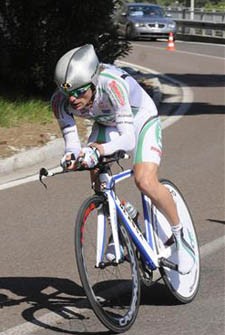Rules require minimum payment of €33,000 to ProTeam riders
 Danilo Di Luca may have said that he will race for free in 2011 as part of his rehabilitation to professional cycling, but measures introduced to protect riders means that the UCI won’t allow him to compete without a salary.
Danilo Di Luca may have said that he will race for free in 2011 as part of his rehabilitation to professional cycling, but measures introduced to protect riders means that the UCI won’t allow him to compete without a salary.
The Italian rider plans to race with the Katusha team this season; to do that, states the governing body, he’ll have to accept a salary of at least €33,000 and also pay a large penalty relating to his positive test.
“If Di Luca really wants to get back in cycling, he has first to pay the financial sanction of €173,000 linked to his antidoping violation,” UCI spokesman Enrico Carpani told VeloNation early Tuesday.
“After that, his new team has to submit his contract to the UCI in order to let it examined by Ernst & Young. If everything is done in compliance with UCI rules and the joint agreement – which means a minimum salary for the rider – he will be eligible to ride.”
Already under suspicion of doping due to irregular hormone levels en route to his 2007 Giro d’Italia victory plus his long association with the controversial Italian doctor Carlo Santuccione, Di Luca tested positive during the 2009 Giro. He finished second to Denis Menchov, then was announced as positive for the third generation EPO agent CERA.
That led to a suspension of two years, but this was later reduced due to cooperation with investigators.
Di Luca initially maintained his innocence, protesting that he had done nothing wrong, but ultimately made a public confession last month in front of 500 students in Possagno, Italy. That contrition paved the way for the contract with Katusha, which he signed in the same place yesterday.
“I feel like a new man and I will race for free,” he told La Gazzetta della Sport. “All I have agreed with [general manager Andrei] Tchmil is a prize system.”
However racing for bonuses alone is not permissible, according to the UCI, which has minimum wage levels in place for ProTeam and Pro Continental squads in order to ensure that riders are treated fairly.
“It’s not possible to be part of a professional team without a salary,” Carpani told VeloNation. “Cycling is a professional sport, which did great efforts in the recent past to improve its structure and to protect riders, and no one could be part of it just for free.”
If Di Luca is serious about not taking a payment this season, it seems he will have to accept the salary and then pledge it to charity. That will however still require Team Katusha to hand over a minimum of €33,000 (as confirmed to VeloNation by the UCI) to the Italian in 2011, which is money that will not have been budgeted for under the agreement to take Di Luca on.